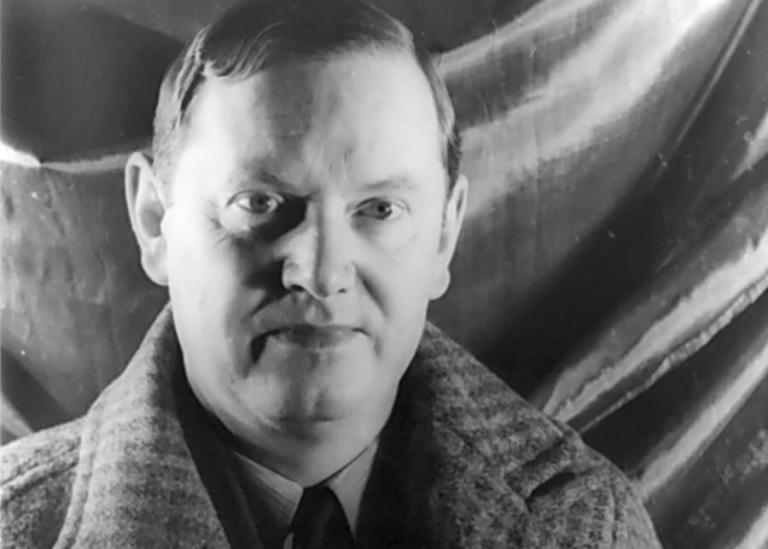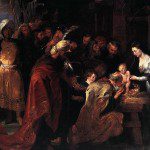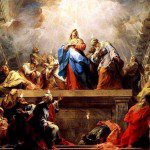
Evelyn Waugh, Catholic novelist, unimpressed with Mr. Joseph Bottum. (Photo credit: Carl Van Vechten, 15 December 1940; public domain.)
Of all things in literature, the one that is the most futile and impossible to generalize about is the novel. There are no limits to its form: That is a mark of its strength. No one can agree even on when the novel began; the standard narrative is that the first novel was Robinson Crusoe (1719), but that’s more a myth of convenience—and cultural chauvinism—than anything else. What about the 11th century Japanese Tale of Genji? The 12th century Arabic Hayy ibn Yaqdhan? The “Four Great Classical Novels” of the Ming and Qing dynasties? Even in the West, many today will push it back and say that the first novel in the proper sense (however you define “proper sense”) was Don Quixote (1605). But even that is difficult to sustain: What about Gargantua and Pantagruel (1532-1564)? Certainly the Czech novelist Milan Kundera seems to think the novel can be dated back to Rabelais. But even before Rabelais, prose fiction had its precusors in medieval romance: like Thomas Malory’s Morte D’Arthur (1485), or the Arthurian legends of Chretien de Troyes); and even classical literature, like the Satyricon of Petronius, or Apuleius’ Golden Ass. The most you can say is that, starting with Crusoe in eighteenth century England, the novel really became a dominant literary form. And it exploded in the nineeenth.
Much of the problem of dating the beginning of the novel has to do with how you define it. But how do you do that? To do so in the most obvious way—“long prose fiction narrative”—is immediately to bump up against novels that don’t fit. Pale Fire (1962) is not prose. The Executioner’s Song (1979) is not fiction. And anyone who tries to explain what Finnegans Wake (1939) is deserves all the despair that comes his way. The novel resists every attempt at definition. So for Joseph Bottum, writing in the latest issue of Books and Culture, to be so sure that the novel, whatever else it is or is not, is Protestant, is unduly and perilously bold. And the difficulty in critiquing his article is that nearly everything he says he qualifies to the point of nullification. He is his own most effective refutation of himself.
***
Here is his thesis:
The novel was an art form—the art form—of the modern Protestant West, and as the main strength of established Protestant Christendom began to fail in Europe and the United States in recent decades, so did the cultural importance of the novel.
But now watch how the next paragraph begins.
The proposition begins to unravel as soon as we offer it, of course. By the time we are done listing all the demurrals, adjustments, and trimmings, little seems left of the notion that the novel is an artifact of the Protestant West.
See what I mean? Then, no sooner than he qualifies his thesis in this way, he gives us another asterisk.
Little, however. Not nothing.
Oh. So however tenuous he admits his thesis is, he is going to latch on to the least shredded scrap of it he can. No sooner can you rebut him than he rebuts himself, and then goes on to say, “But still and all, I am right, by gosh!”
(And did you notice that, on top of calling the novel Protestant, Mr. Bottum also calls it an “artifact”? You would think we were digging these things up with spades. Keep that in mind; it will be important when we get to the end.)
Next he says:
[I]t’s not much of a leap to argue that the Protestantism of those foundational English novelists [Defoe, Richardson, and Fielding] would have an effect on the shape of the novel down through the ages.
Well, sure, it may not be “much of a leap” to suggest that, but then you need to show that it did, and how it did; and you also need to account for the quite profuse number of “shapes” the novel has taken “down through the ages.” That’s where things get tricky.
Something in the confident precincts of western culture really did latch on to extended prose fiction in the eighteenth century, and wouldn’t let it go as it rolled by.
Yes, fine. I get that. But why is Mr. Bottum so convinced that it was Protestantism? To show that it was, he would need to explain what is uniquely Protestant about the novel that no other genre before it did, or as well; and he would also need to show that what John Updike does is more suited to the novel than what Graham Greene does. That can be tough to do.
“The novel,” Mr. Bottum says, was
the artistic device by which the culture undertook some of its most serious attempts at self-understanding.
Well, no; that’s not quite right. Many novels do put their own culture under a glass: Look no further than Bleak House (1852), or The Way We Live Now (1875); or, in another century, Light in August (1932), The Grapes of Wrath (1939), and Invisible Man (1952). But cultures do not write novels; individuals do. The culture did not write The Gulag Archipelago (1973); Solzhenitsyn did. Cultures generally tend to resist self-understanding. The artist is a threat; as he should be. Or she. A book, said Kafka, is an “ice pick.”
Apart from that, authors from a lot of different cultures write novels, and well. Regency England of Pride and Prejudice (1813) is not the unnamed African country of A Bend in the River (1979), whose narrator is an Indian Muslim. Yet both are masterpieces of the novel.
The form of that device was developed to explain and solve particularly Protestant problems of the self in modern times.
Oh? And what are these “particularly Protestant problems”? Why don’t Jews or Catholics have these problems, and if they don’t, why are they writing novels? What “particularly Protestant problems” does Saul Bellow labor with in The Adventures of Augie March (1953)? Is Portnoy’s Complaint about Protestant angst? Harriet Beecher Stowe did not seem too worried, when she wrote Uncle Tom’s Cabin (1852), about the self. Other problems were vexing her at the time.
You could say that Mr. Bottum tends to extrapolate too broadly without warrant. Or that his view of the novel is culturally and religiously cramped and closeted to the point of claustrophobia. And—here’s the problem—he recognizes this himself, even as he insists on his own thesis.
No one has any compelling idea of what unites The Manuscript Found in Saragossa, Fanny Hill, Notes from Underground, My Ántonia, Nausea, and Midnight’s Children as a single type of writing. No one has any serious notion of what could possibly make the English writers Thomas Love Peacock, Ann Radcliffe, William Harrison Ainsworth, A. A. Milne, Daphne du Maurier, and Anthony Powell a single kind of author, even though we say that they all wrote novels.
No, of course not. As I pointed out from the start, it is the novel’s strength that it resists all efforts to limit or describe it, or confine it to a given nation, or culture, or religion. Virginia Woolf wanted a room of her own, but she did not say that only she should have a room. And it’s not just English authors, either, who are “a single kind,” but add those from all the other nations: Nadine Gordimer, Gunter Grass, Margaret Atwood, Victor Hugo, Sigrid Undset, Haruki Murakami, Gabriel Garcia Marquez, Rohinton Mistry, Ha Jin, Don DeLillo, Chinua Achebe, Khaled Hosseini. These are all a “single kind of author,” as are novelists across a spectrum of religions: Charles Dickens, Leo Tolstoy, James Joyce, Franz Kafka, Albert Camus, Achmat Dangor, V.S. Naipaul.
But Mr. Bottum can’t allow himself to be “forced back to the broad category of the novel simply as an extended piece of fiction,” because that would mean accepting that there were novels around prior to eighteenth-century England, and that does not fit his thesis about the novel being Protestant. But a Catholic wrote Don Quixote and a Catholic wrote Gargantua and Pantagruel; Cervantes fought in the Battle of Lepanto, while Rabelais was a Franciscan monk. How are these not novels?
Mr. Bottum will admit that Quixote may be a novel, since he finds “a new and different world” there—one more recognizably modern. (By “modern” Mr. Bottum simply means “post-medieval.”) But he’s sure that Gargantua and Pantagruel, whatever Kundera might have thought about it, is instead a “sprawling mess” and “not quite the tight and self-complete great work of art” of the “High Victorians.” (By “High Victorians,” he has in mind someone like Henry James, who famously castigated the nineteenth-century novel as a “loose, baggy monster.”) But James did not have Rabelais in mind when he said that; he was thinking of authors like Melville, Tolstoy, and Dickens. Mr. Bottum would not say Moby-Dick (1851) or War and Peace (1869) or David Copperfield (1850) are not novels. If ever there were a “sprawling mess” among novels, it would be Moby-Dick. But it would be less without the sprawl, or the mess. Should we put Melville in another room? Or Hugo?
***
The novel, says Mr. Bottum, is characterized by four main qualities. It has
- “a sense of spiritual development over the plot’s timeline.”
- “characters with interior selves.”
- “a drive toward artistic unity.”
- “an ambition for the book to be revelatory commentary on the human condition.”
Well, that will do as a very—very—broad definition of what you can find in the novel. But it will also do as a description of all the rest of literature. You will find spiritual development in Dante, the interior self in Hamlet, artistic unity in the sonnet, commentary on the human condition in Ecclesiastes. While all these things exist in novels by Protestants, they also exist in nearly all literature by everyone else. Why any of these things are peculiarly Protestant, or suited for the novel, Mr. Bottum does not say. It is the one thing he most fails to prove: his own very point.
“Every breakthrough in the form,” he says (in the despair of another qualification) “appears to have predecessors.” Yes. Every breakthrough in any form does; Yale literary scholar Harold Bloom told us about all this long ago—it’s called the anxiety of influence. But (Mr. Bottum qualifies it once more):
something separates the Catholic Spain of 1605 in which Don Quixote appears from the Protestant England of 1719 in which Robinson Crusoe is published. Something has allowed the inner life of the hero to appear on the page.
Yes, yes; something, something. But he is so sure that it must be Protestantism? Why? How are any of these things new with Defoe? You can find “the inner life of the hero” in Hamlet. You can find it in Augustine! Why is “the inner life” Protestant? What about St. John of the Cross or St. Teresa of Avila? Or the Desert Fathers?
But Mr. Bottum tries another tack, which is to suggest that, in the novel, you find “the confident sense of modernity as an age defined by more than its rebellion against the medieval past.” So Catholicism is somehow “the medieval past,” and Mr. Bottum seems to think that its main characteristic—at least in fiction—was the picaresque. So at its beginning, you will find that the novel was burdened by picaresque elements (as in Cervantes, or Tom Jones, or the early Dickens), but at last it shed all that baggage by the time those like James and Conrad got to work.
The only problem with all of that is, the picaresque is a continuing tradition in the novel down to our own day. It is one of many, many strains in fiction. You find it in Kim (1901), Tropic of Cancer (1934), The Adventures of Augie March (1953), Felix Krull (1954), Under the Net (1954), The Painted Bird (1965), Baudolino (2000), and The White Tiger (2008). You find it as well in (and Mr. Bottum concedes these) Naked Lunch (1959) and Infinite Jest (1996).
But in spite of all its troublesome picaresque elements, Mr. Bottum finds that Don Quixote is modern because of its “turn against the failures and oddities of late medieval culture.” It is picaresque in a satirical way. Oh. So give him a few more years, and Cervantes may have turned Protestant? Is that what Mr. Bottum is getting at here? For he says that those eighteenth-century English novelists were the “heirs to modernity’s early victories [over] the comic failures of the late Middle Ages.” What “comic failures”? The inadequacy of picaresque as a coherent art form? The fact that Cervantes used it to mock it? Is that what caused the waning of the Middle Ages? England just simply had to shake off this Catholic past before the novel could really come into its own, and now we’re at last modern? That’s what Mr. Bottum tells us.
After the Glorious Revolution in 1688, novels were free to be modern, the old medieval systems unimportant to an English Protestantism that had made its peace with the world.
And thus, he says, the novel is Protestant “all the way down.” Really? With so many qualifications, which not even Mr. Bottum himself can deny, how can it be anything “all the way down,” still less Protestant? For in his very next paragraph, he allows that there is just as much “determined Catholicism” in novels as Protestantism. “Or Marxism. Or feminism, atheism, fascism, libertarianism, and extraterrestrialism.” And Judaism too, if you don’t want to leave out such geniuses as Bellow, Malamud, Kafka, and Roth. Is Operation Shylock (1993) “Protestant all the way down”? For every Protestant author Mr. Bottum cites—Updike, Hawthorne, Trollope, Marilynne Robinson—one can cite Catholics: Mauriac, Percy, Endo, Ron Hansen. Then there are complicated cases like Hardy, Fowles, Rushdie. Is Vipers’ Tangle (1933) something other than a true novel?
***
Then there are passages that make me scratch my head and wonder whether there is some anti-Catholic axe Mr. Bottum needs to grind. Like this one:
The sin of hypocrisy burns like Satan’s signal-fire for Victorian novelists. Not for them the saturnine sophistication of the Continental aphorists or the Catholic cultures’ droll shrug at insincerity and pretense, the comedy of the Goliard poets and Rabelais derived ultimately from the ex opere operato principle of sacramental theology.
Oh. Well, that is all just so overwrought. Protestants, Mr. Bottum tells us, want a “clean world” and an “honest world.” Not like those Catholics, who wanted a dirty, lying world? I don’t follow. When Hamlet said, “To be honest, as this world goes, is to be one man picked out of ten thousand,” am I to think he was just “shrug[ging] at insincerity and pretense”? No. Hamlet hated pretense. He hated lying. “Bloody, bawdy villain” does not sound like the words of someone who was giving the king’s foul deeds a droll shrug. The idea that the Protestants of eighteenth-century England discovered the evil of hypocrisy is just absurd nonsense. “God has given you one face,” Hamlet said, “and you make yourselves another.”
But Dickens, who railed against the evils of his age, was, Mr. Bottum says,
very much instantiating a Protestant insight into morality, derived from a Protestant metaphysics. However powerfully our society controls us, it is an epiphenomenon created by the metaphysical drama of the soul.
I see. And the Protestant novel invented this? That’s what Mr. Bottum asks us to believe? It is a Protestant discovery that the individual is “an actual object of grace and salvation”? It seems that is what Mr. Bottum wants us to think. The novel is Protestant, he says, because it was invented to explore “the inner life [and] self-consciousness as self-understanding.” But no. That can’t be right: Augustine got there first in Christianity, and the author of Job got there before him. Where would Shakespeare have been without his ability to portray “self-consciousness”? This was not some “invention in modernity … absen[t] in previous literature.” Think of Don John’s speech in Act I, Scene III of Much Ado About Nothing, in which he lays bare the root of his own sadness.
I cannot hide what I am. I must be sad when I have cause and smile at no man’s jests, eat when I have stomach and wait for no man’s leisure, sleep when I am drowsy and tend on no man’s business, laugh when I am merry and claw no man in his humor. … In this, though I cannot be said to be a flattering honest man, it must not be denied but I am a plain-dealing villain. I am trusted with a muzzle and enfranchised with a clog; therefore I have decreed not to sing in my cage. If I had my mouth, I would bite; if I had my liberty, I would do my liking. In the meantime, let me be that I am, and seek not to alter me.
In two early novels, Clarissa and Robinson Crusoe, Mr. Bottum finds tales of sanctification and of being born again. You would think these were Protestant discoveries about the life of faith that Catholics had all that time been unaware of. He seems to be on more solid ground when he notes that Crusoe, on his island, reads the Bible
without a church community or teacher to aid him, sheerly from the power of the divine text itself on an individual conscience.
Yes, I get that. But am I to think that the whole history of the novel owes itself to that one scene? that the novel is born from an argument for sola scriptura? That is an odd thing to say; though, of all the examples Mr. Bottum gives, this one scene in this one novel is the only one that can be said to be peculiarly Protestant.
Crusoe, Mr. Bottum tells us, is best read as “a Presbyterian tale of redemption revealed to its hero by adversity.” Defoe’s novel is certainly that, but I don’t know how that makes it “Presbyterian” even if Defoe was. That could be a description of Job. King Lear is redeemed through adversity. The whole plot of Lear is about how an old and self-destructive fool is redeemed, in the end, by his daughter’s love. So this is not some new story that Defoe invented because he wasn’t burdened by a bunch of Catholic ideas. The story of the hero redeemed through adversity is an old story, and it is far from uniquely Protestant. But Mr. Bottum will insist on it:
The journey of the self is the deepest, truest thing in the universe, and the individual soul’s salvation is the great metaphysical drama played out on the world’s stage.
All of which may be true, but you can find all of that in the Oedipus cycle. You think there’s no “journey of the self” in those plays? Or in the Odyssey?
***
At the end of his essay, Mr. Bottum insists that a Catholic novel is “a little tricky, a little verging on the self-contradictory.” Catholic novels are “at war with [their] own form.” Protestantism is a given in the novel, he says. It doesn’t need to make a show of itself; it just is. But he never shows that to be true. He also does not tell us whether Jewish novels are self-contradictory, or Muslim novels, or atheist novels, or novels by agnostics and Hindus. In an effort to show that at least Catholic novels are failures, he chooses two of the weakest: The Man Who Was Thursday (1908) and A Confederacy of Dunces (1980). Trying to prove his thesis by reference to Chesterton and Toole rather than, say, Greene and Percy is a transparent effort at easy validation. Are The Power and the Glory (1940) or The Moviegoer (1961) failures? I would want Mr. Bottum to choose the best Catholic novels that have been written, by the best authors. I would want him to show how Waugh was just a piker. Or Muriel Spark.
Mr. Bottum has a bold thesis, but he can’t prove it. In fact, it’s easy to disprove. The novel, as a form, is no more Protestant than it is Catholic, no more Jewish than atheist. If the history of the novel tells us anything at all, it is that there is nothing that it can not be and can not do. There is no culture, no religion, no perspective, that cannot find expression in the novel. Nor is the novel caged by aesthetic form. That is why one can say that both Henry James and James Joyce, both Charles Dickens and Virginia Woolf, both E.M. Forster and Haruki Murakami, both Joseph Conrad and Salman Rushdie are novelists. The one and only thing the novel cannot be is defined.
Mr. Bottum ends with a question.
[A]s the atmosphere grows thinner and thinner in the West, as confidence fails, where shall we seek our future arts, our future selves?
This is the old “death of the novel” nonsense, though Mr. Bottum finds its death in secularism rather than new technology. Normally it’s new technology, or the new and dumber generation, that’s supposed to kill the novel flat dead. I have never been convinced of any of it: Morose critics have been prophesying the death of the novel since the birth of the novel. You could say, as Mr. Bottum does, that the novel no longer girds the culture as of yore. But it never did. Must I think that it will drop to the floor now as it all unravels? Goodnight, sweet prince? No. The novel, like any art form, always stood against the culture; with nostalgia, we read back into an earlier age an Eden that was not there. Thus Mr. Bottum only imagines that the novel must be dying because the Christian west is. That is short-sighted, both about the novel and about Christianity. It is angst, no more. The novel, like a living stream, is in constant change and motion. No one has written a High Victorian novel for a long time; Fowles only could imitate it, in an ironic way, in The French Lieutenant’s Woman (1969). John Barth has great good fun in The Sot-Weed Factor (1960). The novel goes on, and thrives. There are too many great, and inventive, ones being written to sound the knell.
As for Christianity, it does face new challenges now than it did when it was a cultural given in the West. But why that means that those challenges can’t be met through the novel is a question Mr. Bottum does not answer. The novel should pose a challenge to a hostile culture. Was Soviet Russia friendly to Solzhenitsyn? America has never been a Jewish nation, but Roth and Bellow have done no less well writing great novels than Updike and Melville did. The novel itself—and great Christian novels, both Protestant and Catholic—will go on long after Mr. Bottum has gone on, and all the rest of us.











